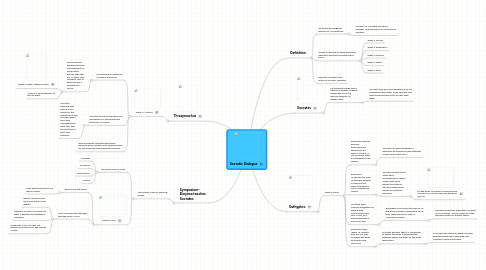
1. Thrasymachus
1.1. What is Justice?
1.1.1. Thrasymachus' definition of justice was given.
1.1.1.1. Thrasymachus believed that the stronger party in each nation passes laws that are of their own. Whoever fails to keep the law is punished as unjust.
1.1.1.1.1. "Might is right"-Thrasymachus
1.1.1.1.2. Justice is advantegeous to the stronger.
1.1.2. Socrates found all the flaws and unravelled it in Thrasymachus' definition of justice.
1.1.2.1. Socrates believed that justice is not what is in the interesets of the stronger when the rulers unintentionally pass laws that are contrary to their own interests.
1.1.3. Both eventually admitted ignorance because both Socrates and Thrasymachus do not know the true meaning of justice.
2. Symposium- Dioyima teaches Socrates
2.1. Starts with a love of physical things.
2.1.1. Becomes love of virtue.
2.1.1.1. Courage
2.1.1.2. Prudence
2.1.1.3. Temporance
2.1.1.4. Justice
2.1.2. What is love?
2.1.2.1. People love the good.
2.1.2.1.1. They want the good to be theirs forever.
2.1.2.2. Love is giving birth, whether through body or soul.
2.1.2.2.1. Beauty releases pain, thus love wants is not beauty.
2.1.2.2.2. Pregnant in body is to seek out what is beutiful and engage in childbirth.
2.1.2.2.3. Pregannat in soul to seek out wisdom and the rest of the virtues of love
3. Definition
3.1. An active and negative method of conversation.
3.1.1. Consists of constant questions, answers, and dissection or crtiticism of answers.
3.2. Allows a new way to think about the definition and the true meaning of terms
3.2.1. What is virtue?
3.2.2. What is happiness?
3.2.3. What is justice?
3.2.4. What is piety?
3.2.5. What is holy?
3.3. Requires courage to be active in Socratic Dialogue.
4. Socrates
4.1. He travelled in high social classes in Athens, seeking challenges from the leading Sophists to debate with.
4.1.1. He eventually won and defeated all of his challengers who seem to be ignorant and naive because they won't accept their limits.
5. Euthyphro
5.1. What is Holy?
5.1.1. Euhtyphro defines holiness asprosecuting those who are guilty of crime. To not proscute them is considered to be unholy.
5.1.1.1. Socrates unravels Euthyphro's definition by going through examples of holy and unholy acts.
5.1.2. Euthyphro re-defines his view of holiness as what is loved by the gods; and what is not is considered unholy.
5.1.2.1. Socrates believes that gods have disagreements. Which means that some things are loved by the gods while other things are hated by the gods.
5.1.2.1.1. Do the gods love what is holy because it is holy or is it holy because the gods love it?
5.1.3. Socrates then lectures Euthyphro by stating that everything that is holy is just, but everything that is just is not holy.
5.1.3.1. Euthyphro concludes that service to the gods is what is considered to be holy, while service to men is considered unholy.
5.1.3.1.1. Socrates questions Euthyphro on what service means. Is it by means to make the gods better or benefit them?
5.1.4. Euthyphro then ,again, re-defines holiness is a way to please the gods by prayers and sacrifices.
5.1.4.1. Socrates believes that it is impossible to please the gods through earthly materials which are given by the gods themselves.
5.1.4.1.1. Socrates then leaves Euthphro baffled with the mysteries in which he had claimed to have discovered.
